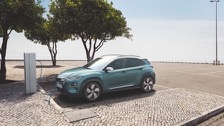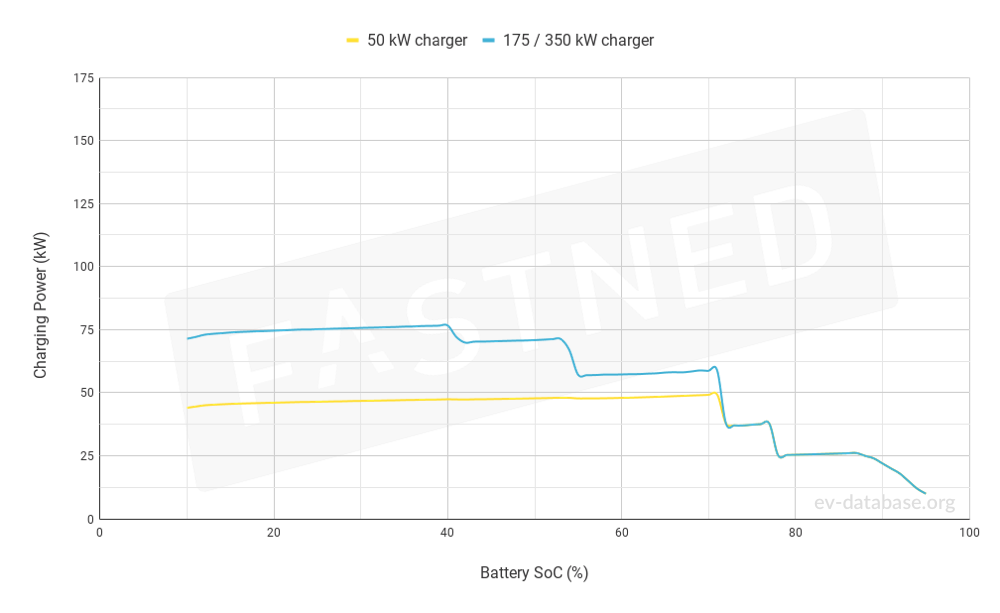Price from (last known) £39,150
| Availability | Out of production |
| Available from | November 2019 |
| Available until | April 2021 |
| Annual VED | £0 |
| Congestion Charge | £0 |
| Insurance Group | 26-27 |
Price shown is the last known On The Road price: it includes VAT, first year VED, vehicle first registration fee, number plates and delivery.
Real Range between 175 - 370 mi
| City - Cold Weather | 240 mi |
| Highway - Cold Weather | 175 mi |
| Combined - Cold Weather | 205 mi |
| City - Mild Weather | 370 mi |
| Highway - Mild Weather | 225 mi |
| Combined - Mild Weather | 285 mi |
Indication of real-world range in several situations. Cold weather: 'worst-case' based on -10°C and use of heating. Mild weather: 'best-case' based on 23°C and no use of A/C. The actual range will depend on speed, style of driving, weather and route conditions.
Battery and Charging
| Battery Capacity * | 67.5 kWh |
| Charge Port | Type 2 |
| Port Location | Front - Middle |
| Charge Power † | 11 kW AC |
| Charge Time (0->245 mi) † | 7 hours |
| Charge Speed † | 36 mph |
| Battery Useable | 64.0 kWh |
| Fastcharge Port | CCS |
| FC Port Location | Front - Middle |
| Fastcharge Power (max) | 77 kW DC |
| Fastcharge Time (25->196 mi) | 44 min |
| Fastcharge Speed | 230 mph |
† This can only be achieved using a 3-phase grid connection. The majority of homes and charge points do not have this connection. In practice charge power will often be 7.4 kW, allowing for a charge time of 10h15m and a charge speed of 24 mph.
Energy Consumption
EVDB Real Range
| Range | 245 mi |
| Vehicle Consumption | 260 Wh/mi |
| CO2 Emissions | 0 g/km |
| Vehicle Fuel Equivalent | 155 mpg |
WLTP Ratings
| Range | 301 mi |
| Rated Consumption | 235 Wh/mi |
| Vehicle Consumption | 210 Wh/mi |
| CO2 Emissions | 0 g/km |
| Rated Fuel Equivalent | 171 mpg |
| Vehicle Fuel Equivalent | 190 mpg |
Rated = official figures as published by manufacturer. Rated consumption and fuel equivalency figures include charging losses.
Vehicle = calculated battery energy consumption used by the vehicle for propulsion and on-board systems.
NOTE: The fuel equivalency figures are shown in IMPERIAL MPG. Figures in US MPG will differ significantly.
Real Energy Consumption between 170 - 365 Wh/mi
| City - Cold Weather | 265 Wh/mi |
| Highway - Cold Weather | 365 Wh/mi |
| Combined - Cold Weather | 310 Wh/mi |
| City - Mild Weather | 170 Wh/mi |
| Highway - Mild Weather | 280 Wh/mi |
| Combined - Mild Weather | 220 Wh/mi |
Indication of real-world energy use in several situations. Cold weather: 'worst-case' based on -10°C and use of heating. Mild weather: 'best-case' based on 23°C and no use of A/C. The energy use will depend on speed, style of driving, climate and route conditions.
Dimensions and Weight
| Length | 4180 mm |
| Width | 1800 mm |
| Width with mirrors | 2070 mm |
| Height | 1570 mm |
| Wheelbase | 2600 mm |
| Weight Unladen (EU) | 1760 kg |
| Gross Vehicle Weight (GVWR) | 2170 kg |
| Max. Payload | 485 kg |
| Cargo Volume | 361 L |
| Cargo Volume Max | 1143 L |
| Cargo Volume Frunk | 0 L |
| Roof Load | 80 kg |
| Tow Hitch Possible | No Data |
| Towing Weight Unbraked | 0 kg |
| Towing Weight Braked | 0 kg |
| Vertical Load Max | No Data |
Miscellaneous
| Seats | 5 people |
| Isofix | Yes, 2 seats |
| Turning Circle | 10.6 m |
| Platform | No Data |
| Car Body | SUV |
| Segment | Small Family Car |
| Roof Rails | Yes |
| EV Dedicated Platform | No Data |
Company Car Tax Indication
Financial Year 2019-20
| BIK Tax Rate | 1% |
| P11D Value from | £39,095 |
| Benefit in Kind (BIK) | £391 |
| BIK @ 20% | £7 pcm |
| BIK @ 40% | £13 pcm |
| BIK @ 45% | £15 pcm |
Financial Year 2020-21
| BIK Tax Rate | 1% |
| P11D Value from | £39,095 |
| Benefit in Kind (BIK) | £391 |
| BIK @ 20% | £7 pcm |
| BIK @ 40% | £13 pcm |
| BIK @ 45% | £15 pcm |
Financial Year 2021-22
| BIK Tax Rate | 1% |
| P11D Value from | £39,095 |
| Benefit in Kind (BIK) | £391 |
| BIK @ 20% | £7 pcm |
| BIK @ 40% | £13 pcm |
| BIK @ 45% | £15 pcm |
* = estimated value. Average energy consumption and range based on moderate drive style and climate. Real-life values may differ significantly. Pricing information might not be actual for some regions. No rights can be derived from the information on this site.
All about the Hyundai Kona Electric 64 kWh
No longer available
This electric vehicle is no longer in production and not available to buy new. The Hyundai Kona Electric 64 kWh was available from November 2019 until April 2021. Financial data like price, leasing and company car tax were applicable to the final year of availability of the Hyundai Kona Electric 64 kWh.
A new model of the Hyundai Kona Electric 64 kWh (2019) is available: Hyundai Kona Electric 64 kWh (2021).
Pricing
The Hyundai Kona Electric 64 kWh had a Recommend Retail Price (RRP) of £38,511 and an On The Road Price (OTR) of £39,150. The OTR Price includes VAT, first year of VED, vehicle first registration fee, number plates and delivery.
Drivetrain and Performance
The Hyundai Kona Electric 64 kWh is a full electric vehicle (BEV). The maximum power of the Hyundai Kona Electric 64 kWh is 150 kW (201 hp). The maximum torque is 291 lb-ft. The Hyundai Kona Electric 64 kWh is front wheel drive and can accelerate from 0 to 62 miles per hour in 7.9 seconds. The top speed is 104 mph.
Battery and Charging
The battery of the Hyundai Kona Electric 64 kWh has an estimated total capacity of 67.5 kWh. The usable capacity is 64 kWh. A range of about 245 miles is achievable on a fully charged battery. The actual range will however depend on several factors including climate, terrain, use of climate control systems and driving style.
For example: sustaining high speeds in cold weather could result in a range of around 175 mi. However, driving at low speeds in mild weather will increase the range to around 370 mi.
Charging is done using a Type 2 connector and the on-board charger has a maximum power of 11 kW. This charges a fully depleted battery back to full in around 7 hours. However, a 3-phase grid connection is needed to achieve this. The majority of homes and charge points currently do not have this connection. In most cases the maximum charging power will be 7.4 kW, allowing for a charge time of 10 hours 15 minutes and a charge rate of 24 mph. Charging the car using a regular wall plug will take around 32 hours 45 minutes.
Rapid charging is possible through a CCS connection. The maximum rapid charge power is 77 kW. The battery can't be charged continuously at this power. In an average rapid charge session the average charge power will be around 64 kW. This charges the battery from 10% to 80% in around 45 minutes. A rapid charge like this will add about 170 miles of range.
Energy Consumption
The combined (motorway and city) energy consumption of the Hyundai Kona Electric 64 kWh is about 260 Wh per mile. By comparison, this energy consumption is the equivalent of a fuel consumption of 155 mpg in a traditional petrol car.
The actual energy consumption will depend on several factors including climate, terrain, use of climate control systems and driving style. For example: sustaining high speeds in cold weather could result in an energy use of around 365 Wh per mile. However, driving at low speeds in mild weather will increase the efficiency to about 170 Wh per mile.
CO2 Emission
The Hyundai Kona Electric 64 kWh emits no CO2 during driving. This only includes direct emissions from the vehicle itself. The energy needed to charge the battery might have been (partly) generated by the use of fossil fuels. Vehicles with an internal combustion engine will always emit CO2 during driving. Additionally, CO2 is emitted during the production and transport of fossil fuels.
Preceding model
The model shown on this page is the successor of the Hyundai Kona Electric 64 kWh, which was available from October 2018 until October 2019. The previous model was £2805 less expensive, had 5 mi less range, 4% faster acceleration and was similar in energy consumption.
 Preceding model Hyundai Kona Electric 64 kWh
Preceding model Hyundai Kona Electric 64 kWh



 Preceding model Hyundai Kona Electric 64 kWh
Preceding model Hyundai Kona Electric 64 kWh 







Tidak ada komentar:
Posting Komentar